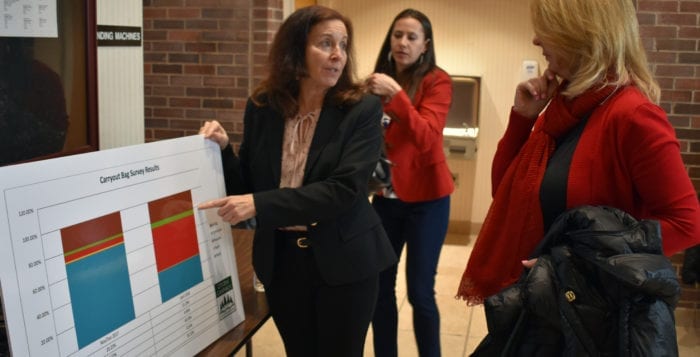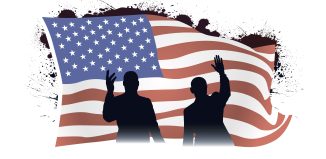Environmental advocacy group’s survey shows decrease in plastic bag use following fee

Though there are still people in Suffolk County who regularly kick themselves for forgetting to bring their reusable bags into stores, a newly-released survey says the law that enforces a five-cent per bag fee has so far been effective.
Legislature to vote on statewide ban of plastic bags
By Desirée Keegan
At the state level, Gov. Andrew Cuomo (D) announced a bill to ban single-use plastic bags across the state April 23, which would begin in January 2019 if passed. The three-page bill, introduced by the governor a day after Earth Day, comes a little more than a year after he blocked a 5-cent surcharge that New York City had sought to place on plastic bags.
Cuomo described the measure as an effort to counteract the “blight of plastic bags” that is taking “a devastating toll on our streets, our water and our natural resources,” he said in a statement.
Seeking re-election for a third term in the fall, Cuomo then quoted an adage: “We did not inherit the Earth, we are merely borrowing it from our children.”
If the bill were to pass, New York would join California, which approved a statewide ban of plastic bags in 2016. Hawaii has a de facto ban on plastic bags; all of its counties have instituted bans.
But the measure faces an uncertain path in the Legislature, where leaders of the Assembly and the Senate had opposed the city’s bill. The measure would very likely face a stiffer challenge in the Republican-majority Senate.
Under Cuomo’s proposal, a variety of bags would be exempt from the ban, including those that contain raw meat, fish or poultry; bags sold in bulk; those used in bulk packages of fruit and dried goods; those used for deli products; newspaper bags; trash, food storage and garment bags; and takeout food bags. The state’s Department of Environmental Conservation would also be allowed to exempt certain bags through regulations.
The news comes after advocates from across the state gathered the same day in Albany to hold Cuomo accountable for meeting his climate and clean energy commitments.
“Today, New Yorkers delivered a message to Governor Cuomo: Walk the talk on climate action; follow through on your words, because lasting change only happens through action and putting goals into law,” said Peter Iwanowicz, executive director of Environmental Advocates of New York. “New York has a remarkable opportunity to be an international leader on climate if, and only if, we embrace a future powered by renewables. The people of the state will continue to remind Governor Cuomo of this opportunity until he takes advantage of it.”
“And this is only in three months since the law passed,” Executive Director of Citizen’s Campaign for the Environment Adrienne Esposito said to the Suffolk County Legislature’s Health Committee April 19. “This is a great success. Public behavior is changing.”
In November and December of last year, her environmental advocacy group conducted a study that showed 70 percent of 20,000 Suffolk County shoppers surveyed left a store with a plastic, non-reusable bag in tow. Only 6 percent of customers surveyed used a reusable bag.
After a new survey of 6,000 people this month in 20 grocery stores throughout the county, just 30 percent of those surveyed bought plastic bags and 43 percent were now carrying reusable. Twenty-one percent of people shopping in those grocery stores decided not to take a bag.
“As we celebrate Earth Day it’s great to have news that the bag fee is effective, said Legislator William “Doc” Spencer (D-Centerport). “I know that there were concerns with adopting the bag law, but to see real, tangible results in such a short period of time, I think it’s very exciting.”
Ocean plastics have become a real concern to a number of environmental scientists and advocacy groups, and Esposito said the next goal is to see if there’s a way to reduce the use of other sources of plastic, like straws and utensil.
“Plastic is becoming a real threat to the environment,” she said.
Dr. Rebecca Grella, a Brentwood schools research scientist and teacher, surveyed Flax Pond Marine Laboratory in Old Field in October 2017 and said the amount of plastics found in the water was extremely troubling.
“What we found at the Flax Pond in one square meter [was] 17 grams of microplastics, which are plastics under 5 millimeters [large],” Grella said. “In the entire shoreline of Flax Pond — over a mile of shoreline — we extrapolated there is about 400 pounds of plastic.”
The microplastics are from larger pieces that have eroded along the sea floor until they are smaller in size. They are often ingested by sea life, which not only endangers aquatic creatures but any creature who eat them, including people.
Spencer said that while a total ban on bags would have been more efficient, there was no way to get it passed by the Legislature.
“I think in order to get to this point after years of negotiation, the nickel offered a successful compromise,” Spencer said. “I think the law has worked so well because people don’t want their nickels going to the store.”
“By charging people 5 cents there seems to be a lot of people getting angry and agitated,” Grella said. “In all actuality, it isn’t as easy to put a 5-cent fee on paper or plastic.”
Despite the success, Esposito admitted there is a chance to eventually see an increase in purchased bag use as more people get used to the law.
“We do get concerned about people getting used to the nickel and just paying it,” she said. “So that’s why we need to keep up public education.”
Citizen’s Campaign for the Environment is planning to conduct another survey in November and December to gather a much larger sample size, and survey more than just grocery stores.






